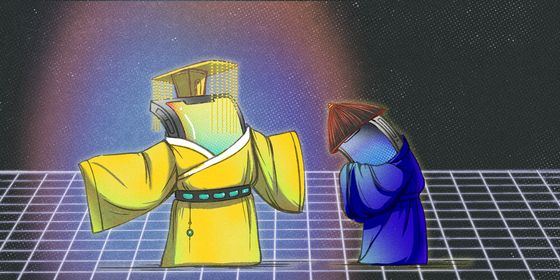Do China’s celebrity-fueled Q&A apps put a fair price on knowledge?
When Wu Jingping quit China’s national ping-pong team as coach in July 2016, having helped achieve four Olympic gold medals at Rio, he imagined his life in the public eye was over. Six months later, Wu was back—this time as a “celebrity author” on Weibo Q&A, part of a burgeoning cash-for-questions industry.
Since its launch in December, 2016, Weibo Q&A has joined Fenda (“One-Minute Answers”) as one of China’s most profitable knowledge-sharing platforms. These differ from sites like Quora, Zhihu, and Reddit by charging for questions and answers: Users pay “experts” a fee to answer personalized questions, either in a 60-second voice message (Fenda) or a written answer (Weibo). Others then pay 1 RMB to “view” the answer. The fees from viewers are split between the initial asker and the expert who answers, with the platform taking a percentage—imagine a celebrity AMA, in which potentially everyone stands to make a little money.
After 26 years coaching ping-pong players like Olympians Ma Lin, Wang Hao, and Xu Xin, Wu Jingping was looking for new opportunities to share his talents when Weibo Q&A came along. On February 8, Wu received a message, soliciting his expertise on the platform. Wu spent over 10 days studying the rules before finally making up his mind to join. He has since answered around 150 questions, and Weibo Q&A has become Wu’s primary method of communicating with fans.
While China’s web users have long been accustomed to free content, some investors are betting on this “knowledge” as the next viable commodity. Others warn that the trend is merely a fad within a volatile sharing-economy.
Trailblazer app Fenda notched up 10 million registered users within 42 days of going live last May; one million of those were paying customers, while another 330,000 were industry “experts,” who helped generate around 18 million RMB in transactions. Fenda’s rapid rise helped it attract an initial 25 million USD from investors including Wang Sicong, China’s richest son. Then in November, it attracted an undisclosed amount of “series A-plus” funding from social media titan Tencent.
Zhihu recently joined the action with a premium paid service, Live. In a recent advert, a boy runs up to a girl, pauses, then jogs on; she looks wistful. “Why don’t guys approach girls anymore?” the ad wonders. Those seeking a serious answer might be disappointed. As with its microblogging service, Weibo’s Q&A platform is predominated by “Big Vs” (verified users with large followings) whose often-brief but lucrative contributions reflect less their expertise than their popularity.
Take Wang Sicong: China’s most outspoken fu’erdai was paid 5,000 RMB to explain, “as a sophisticated person with a wealth of experience, how can you identify a ‘green tea bitch’ based on her appearance?” Wang answered with a simple idiom—“熟能生巧” (Practice makes perfect)1. By April 11, 190,671 people had checked his answer, earning Wang around 22,500 RMB per character. And before Wang joined Weibo Q&A, he was even more active on Fenda. By answering just 32 questions, including “What kind of girl do you like?” Wang earned more than 240,000 RMB in less than two weeks.
Much of Fenda’s traffic is generated by this celebrity gossip, though the rates tend to vary wildly. Responses from Zhang Ziyi, a star of Crouching Tiger, Hidden Dragon, to a fan’s plea for advice attracted less than 100 listeners. But when someone paid 6,666 RMB to ask actress-singer Zheng Shuang how she feels about her ex, Zheng’s two-character answer “尴尬”, embarrassment attracted more than 10,000 views. Both Wang and Zheng now charge 10,000 RMB per question, the highest allowed by Weibo.
Genuine expertise, though, does not seem to command such a price. Economist and social critic Mao Yushi charges 100 RMB per question. Ping-pong coach Wu charges 66 RMB, and his answers have garnered around 170,000 views in total. He said he chooses his questions carefully: “I answer four types—training, basic ping-pong knowledge, advice for young learners, and any other questions I might find meaningful.” Most attract around 1,000 views from his 59,000 followers, meaning the askers usually make back their investment after 150 pay-per-views.
The first question Wu tackled was simple: “Could you give some practical advice for improving my game?” Wu’s 361-character answer attracted 282 views (which meant his first Weibo student made 60.9 RMB in profit). But Wu’s most popular answer concerned his thoughts on a pair of celebrity players, Ma Long and Zhang Jike.
Wu told TWOC that users’ appetite for gossip has made him cautious about the concept of cash-for-questions. “It’s an effective way for me to promote ping-pong, but I know that some people ask questions just to make money,” he said. “I have to control it carefully. I only answer three or four questions a day, and the question has to be related to ping-pong; if not, I won’t answer it.”
According to economist Guo Cheng, visiting professor at Zhongshan University, the attraction of knowledge-sharing apps has little to do with actual knowledge. “For those who really want it, knowledge is everywhere,” Guo told TWOC. “Open courses from Harvard or Yale are all high-end resources that people can access for free. In fact, most people [on Q&A platforms] spend money just get to close to people they are interested in.”
As a Weibo user with over 3 million followers, Guo, who goes by the handle Mr. Think (Zuomo Xiansheng), is himself a “Big V” who has answered more than 160 questions and earned over 100,000 RMB in less than a month since joining Q&A. But Guo said the most popular questions are mostly concerned with novelty (“anecdotes about celebrities or some interesting way to interpret history”) and money—“people always care about their wallet.” Success is dependent on recognition, said Guo: “It only works for those Big Vs; ordinary accounts without enough followers can’t make it big.”
Despite the widely touted investment rounds, Guo doesn’t see much future in these platforms. “Their prosperity is probably a flash in the pan,” he said. “One’s knowledge is limited. Maybe it’s fine to answer hundreds of questions. But when it comes to thousands—how can they keep producing new ideas? And the general public is still more accustomed to free information on the internet.” Meanwhile, there are simpler ways to make money: “If Big Vs can easily make tens of thousands kuai posting ads, why keep answering questions?”
Big Vs may also be wary of censorship. In August, Fenda suspended its service, and claimed to be undergoing a “service upgrade.” The move was widely interpreted a crackdown by authorities; sure enough, when Fenda returned after a 47-day silence, only three of its categories remained—work, health and science.
Another issue is quality control: On most Q&A platforms, anyone can call himself an expert, and there’s no guarantee of either their identity or the veracity of answers. But while the medium may seem new and different, Guo said it follows a familiar pattern: “The form is always changing, from rise to decline, but the root is a modern anxiety for knowledge,” he said. “If people like it, I will continue; if they get bored, I will stop.”
Most Wanted: China’s Most Popular Questions
- Most Wanted Current Affairs
- What’s your opinion on the North Korea issue? What happens if the US uses military force?
- Are there any useful, unwritten rules to the stock market that ordinary people don’t know?
- How should young people deal with surging house prices?
- Why did China’s high-speed trains reduce their top speed?
- Is it right for Beijing to control its population? Isn’t this as wrong as the one-child policy?
- Most Wanted History
- I was born in Chengdu. In the 1980s, there was always heavy fog in the morning. Was that fog or smog?
- Is feng shui just a scam?
- Why did Mo Yan win the Nobel Prize for literature?
- Do you think Liu Cixin will ever write a better novel than his Three Body series?
- Can you comment on the Cultural Revolution from a fresh perspective?
- Most Wanted Personal Life
- Can you offer some practical experiences for making more money?
- Is there any way to deal with procrastination?
- What can I do if I want to lose weight, but can’t control my appetite?
- As a woman, what are some techniques for flirting with native English speakers so I can seem smart, cute, but not too blunt?
- How can I play the role of Diaochan well in [the game] King of Glory?
- Most Wanted Celebrities
- Can you explain why you hate Leslie Cheung?
- Please say something about Jay Chou
- People say that, apart from [the late lead singer of Beyond] Wong Ka
- Kui, there are no real singers from Hong Kong. What do you think?
- Can you share some anecdotes about [actor] Liu Ye’s family?
- What’s your opinion on “little fresh meat” (young, cute male celebrities) like Yang Yang, Li Yifeng, or TFBOYS?
- Most wanted Miscellaneous
- Why is it so hard for Capricorns to build intimate relations with others?
- What kind of men don’t cheat on their partners?
- How can an ugly person avoid discrimination in life?
- Compared with the fu'erdai (“rich second generation”), what are the disadvantages of those born into ordinary families?
- Do we change the world, or does the world change you and me?
Source: Fenda, Weibo Q&A
A Question of Cash is a story from our issue, “Wheel Life China.” To read the entire issue, become a subscriber and receive the full magazine.












